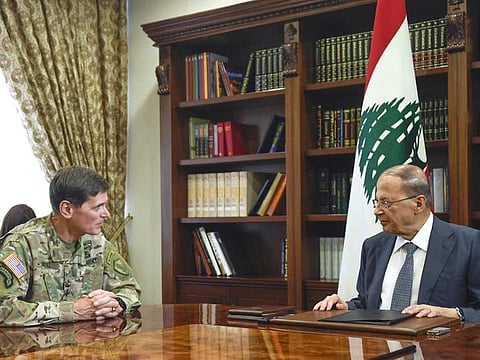USCENTCOM commander meets Lebanese leaders
Votel reiterates backing to army and coordination in the fight against terrorism

Beirut: Lebanon President Michel Aoun met with the commander of the US Central Command (USCENTCOM), Joseph Votel, in what was a highly anticipated consultation to discuss continued American aid to the Lebanese Armed Forces (LAF) as well as coordinate intelligence sharing against terrorist organisations operating in the country and alongside its borders.
Votel reiterated Washington’s commitments to continue its military support to the LAF, and confirmed that the Lebanese military demonstrated innate capabilities to absorb new and sophisticated items. Towards that end, and starting in October, the LAF is scheduled to receive the first of six Super Tucano light attack turboprops, which was contracted in October 2015, originally financed by Saudi Arabia.
In late December 2013, Riyadh offered a $3 billion grant to Beirut to purchase weapons from France and the United States — another $1 billion was added in August 2014 to boost the country’s counter-terrorism forces — though this aid was suspended in early 2016 after Jibran Bassil, the Minister of Foreign Affairs who heads the Free Patriotic Movement and who is allied with Hezbollah, voted against the unanimous League of States (LAS) and Organisation of Islamic Cooperation (OIC) resolutions that condemned Iranian attacks on Saudi Arabia’s embassy in Tehran and its consulate in Mashhad. No details were available on the actual sale and which party may settle the final bill estimated at $462 million.
Importantly, while the Trump Administration is proposing to reduce US military aid to Beirut by 82 per cent in the coming fiscal year [from $103 million in 2017 to $19 million in 2018], Washington pledged to continue its support. It provided more than $1.3 billion in security assistance during the past decade alone, including the transfer of Tow II anti-tank launchers and missiles as well as 18 new Bell UH-1H Huey helicopters. In 2015, Lebanon became the fifth largest recipient of US foreign military financing and the fifth largest annual recipient of US bilateral training programmes though those might now change, something that General Votel discussed with President Aoun.
Although the Super Tucanos will be delivered to Lebanon by July 2019, the US Air Force has begun to train Lebanese pilots with its 81st Fighter Squadron at Moody Air Force Base in the state of Georgia. A total of 12 Lebanese pilot officers and 20 maintenance personnel were learning the procedures, patterns, simulator, and emergency procedures of the aircraft, and are expected to be fully qualified shortly. Importantly, the US has approved that the six aircraft be armed with 70mm rockets fitted with advanced precision capabilities, missile launch detection systems and countermeasure dispensers.
In Beirut, Votel also met with Prime Minister Saad Hariri, Parliament Speaker Nabih Berri, Foreign Minister Jibran Bassil and LAF Commander General Joseph Aoun, not only to keep senior Lebanese leaders fully informed of USCENTCOM activities in the region, but to further engage them in the fight against terrorist activities alongside the country’s largely undemarcated borders.
Press reports confirmed that President Aoun thanked Votel for the intelligence assistance that resulted in a classified pre-emptive LAF military operation in Beirut’s Southern suburbs a few days ago, which avoided a bloodbath. According to a statement issued by Baabda Palace, Aoun told Votel that “pursuing sleeper cells and monitoring their movements led to the arrest of a terrorist group … that was planning to launch attacks in inhabited areas ...[and] it turned out that a Yemeni was among its members” that highlighted some of the immense challenges Lebanon faced.



